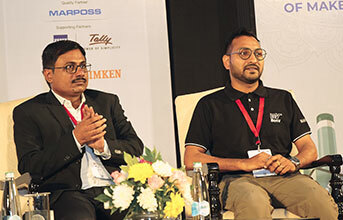
The Festival of Manufacturing hosted an engaging panel discussion on the transformation of India's aerospace and defence sectors as part of the 10- year celebration of Make in India. The esteemed panellists comprising Amol Suryawanshi, Sr. Director – Operations, ideaForge; Col Rajneesh Ralli, Vice President - Growth Operations, Dhruva Space; Maneck Behram Kamdin, SPV and Business Head, Godrej Aerospace; Satyabrata Satapathy, CEO & Co Founder, BonV Aero; Yogesh Ramanathan, Founder & CEO, Vinata Aeromobility Pvt Ltd; AK Kapoor, Outstanding Scientist & Director DRDO (Retired) & Emeritus Scientist; shared valuable insights into the challenges and opportunities within these industries.
Moderated by Anagh Singh, Assistant Vice President at Invest India, the discussion kicked off with a recognition of the pivotal role that aerospace and defence play in India's economic growth trajectory. Singh set the stage by highlighting the ambitious target for defence sector exports turnover, set at US$25 billion by 2025, and posed the crucial question: How can we achieve this target amidst the challenges facing the industry?
Maneck Behram Kamdin, SPV and Business Head at Godrej Aerospace, reflected on Godrej's longstanding commitment to manufacturing in India spanning over 126 years. He also emphasised the organisation's contribution to helping startups with their manufacturing capabilities and expertise, sponsoring colleges with exhibitions, and other contributions to foster innovation within the sector. Despite India's advancements in product design, Maneck emphasised the persistent challenges in manufacturing. He pinpointed two hurdles: the continued reliance on imports for manufacturing components and dependence on controllers from large foreign companies, which are often geographically constrained. Maneck stressed the need for indigenous controllers and machines to drive the growth of the aerospace sector.
Satyabrata Satapathy, CEO and Co-founder of BonV Aero, indicated the important role of funding in enabling startups to achieve the ‘Atmanirbhar' status. He highlighted significant improvements in funding systems with the government also participating in funding startups, particularly in the deep tech space.
Satapathy elaborated on key government initiatives such as iDEX and the Fund of Funds for Startups (FFS) Scheme, which provide financial incentives for startups at various stages of their journey, including proof of concept, prototype development, and market entry. However, he emphasised the need for collaborative efforts between the corporate sector and government schemes, citing the drone industry's financial backing under the PLI scheme as an example.
Amol Suryawanshi, Senior Director of Operations India and USA, at ideaForge, shed light on the various challenges faced by startups venturing into the defence sector. Firstly, securing adequate funding is a hurdle, hindering the growth of budding startups. Secondly, the lack of infrastructure poses significant constraints on execution capabilities. Thirdly, red tape remains a persistent issue, as startups face regulations, especially when seeking permission to test their products. Next, the scarcity of skilled workforce poses a substantial challenge, necessitating collaboration between academic institutions and industries to bridge the skill gap. Lastly, supply chain vulnerabilities increase working capital costs due to the lack of complete indigenisation of components.
Col Rajneesh Ralli, Vice President of Growth Operations at Dhruva Space, highlighted how the last 5 years have been pivotal in terms of the policies that have come up in the defence aerospace sector. However, there are challenges to be overcome. He highlighted three areas crucial for growth in the sector. Firstly, he stressed the importance of commercialisation to leverage the potential of the private industry. By involving private players, innovation can be accelerated, and a broader democratisation of use cases can be achieved. Secondly, Ralli underscored the significance of mega-constellations, drawing attention to the transformative impact witnessed globally, particularly by countries like China and the USA. "The capabilities of such mega-installations are beyond our imagination," he said.
Lastly, he emphasised the importance of deep tech advancements, including AI, robotics, and quantum computing, in driving innovation within the space sector. Ralli noted the existence of the right policies and ecosystem, positioning India at an inflection point. However, there's a need for increased investment in deep tech to unlock its full potential.
AK Kapoor, Outstanding Scientist & Director DRDO (Retired) & Emeritus Scientist, emphasised the need to commercialise the aerospace and defence sectors. He talked about the concept of concurrent engineering; wherein private players are integrated from the initial stages of innovation to familiarise them with the processes.
Furthermore, Kapoor highlighted the significant cost associated with infrastructure, test facilities, innovation, and more, creating the necessity for larger companies to support startups in this regard. He emphasised the role of collaboration between big companies and startups in commercialising R&D within the defence and aerospace sectors to drive growth.
Yogesh Ramanathan, Founder & CEO of Vinata Aeromobility Pvt Ltd, advised startups entering the aeromobility sector to focus on developing a minimum viable product as the prerequisite for establishing a company in this field. He stressed the significance of partnering with technology firms to enhance credibility for early-stage startups.
Additionally, Ramanathan advised young startups to keep an eye out for opportunities and government support. He also spoke about how the transportation sector is standing on the brink of transformation and commuting practices will inevitably change over the next five years. The CEO of Vinata Aeromobility emphasised the need for concentrated efforts in this sector to sustain this pace.
In his closing statement, Suryawanshi said, "We must regard our supplier ecosystem with the same care as our internal manufacturing operations. While we often prioritise Industry 4.0 and lean practices within our factory premises, it's crucial to extend this focus to our broader supplier network. We need to support and coach our suppliers to ensure a seamless and efficient supply chain."
The panellists shared a mutual consensus on the need for indigenisation to solve supply chain challenges and acknowledged the support from government and corporate players. The conversation pointed the way ahead for the industries, emphasising the importance of working together for sustainability and growth.



























